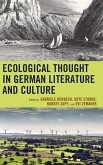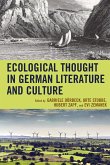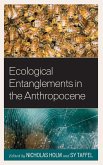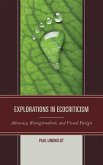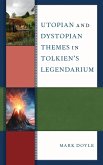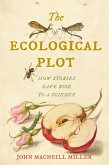Utopian and Dystopian Explorations of Pandemics and Ecological Breakdown
Entangled Futurities
Herausgeber: Alberro, Heather; Castle, Nora; Atasoy, Emrah
Utopian and Dystopian Explorations of Pandemics and Ecological Breakdown
Entangled Futurities
Herausgeber: Alberro, Heather; Castle, Nora; Atasoy, Emrah
- Gebundenes Buch
- Merkliste
- Auf die Merkliste
- Bewerten Bewerten
- Teilen
- Produkt teilen
- Produkterinnerung
- Produkterinnerung
Spanning the environmental humanities and environmental social sciences, this volume brings together utopian and dystopian representations of pandemics from across literature, the arts and media. It will appeal to environmentally minded researchers, academics, and students across various disciplines within the humanities and social sciences.
Andere Kunden interessierten sich auch für
![Ecological Thought in German Literature and Culture Ecological Thought in German Literature and Culture]() Ecological Thought in German Literature and Culture174,99 €
Ecological Thought in German Literature and Culture174,99 €![Ecological Thought in German Literature and Culture Ecological Thought in German Literature and Culture]() Ecological Thought in German Literature and Culture72,99 €
Ecological Thought in German Literature and Culture72,99 €![Bhopal's Ecological Gothic Bhopal's Ecological Gothic]() Pramod K. NayarBhopal's Ecological Gothic130,99 €
Pramod K. NayarBhopal's Ecological Gothic130,99 €![Ecological Entanglements in the Anthropocene Ecological Entanglements in the Anthropocene]() Ecological Entanglements in the Anthropocene144,99 €
Ecological Entanglements in the Anthropocene144,99 €![Explorations in Ecocriticism Explorations in Ecocriticism]() Paul LindholdtExplorations in Ecocriticism142,99 €
Paul LindholdtExplorations in Ecocriticism142,99 €![Utopian and Dystopian Themes in Tolkien's Legendarium Utopian and Dystopian Themes in Tolkien's Legendarium]() Mark DoyleUtopian and Dystopian Themes in Tolkien's Legendarium132,99 €
Mark DoyleUtopian and Dystopian Themes in Tolkien's Legendarium132,99 €![Ecological Plot Ecological Plot]() John MacNeill MillerEcological Plot135,99 €
John MacNeill MillerEcological Plot135,99 €-
-
-
Spanning the environmental humanities and environmental social sciences, this volume brings together utopian and dystopian representations of pandemics from across literature, the arts and media. It will appeal to environmentally minded researchers, academics, and students across various disciplines within the humanities and social sciences.
Hinweis: Dieser Artikel kann nur an eine deutsche Lieferadresse ausgeliefert werden.
Hinweis: Dieser Artikel kann nur an eine deutsche Lieferadresse ausgeliefert werden.
Produktdetails
- Produktdetails
- Verlag: Routledge
- Seitenzahl: 256
- Erscheinungstermin: 31. Juli 2024
- Englisch
- Abmessung: 240mm x 161mm x 18mm
- Gewicht: 552g
- ISBN-13: 9781032385914
- ISBN-10: 103238591X
- Artikelnr.: 70147867
- Herstellerkennzeichnung
- Libri GmbH
- Europaallee 1
- 36244 Bad Hersfeld
- gpsr@libri.de
- Verlag: Routledge
- Seitenzahl: 256
- Erscheinungstermin: 31. Juli 2024
- Englisch
- Abmessung: 240mm x 161mm x 18mm
- Gewicht: 552g
- ISBN-13: 9781032385914
- ISBN-10: 103238591X
- Artikelnr.: 70147867
- Herstellerkennzeichnung
- Libri GmbH
- Europaallee 1
- 36244 Bad Hersfeld
- gpsr@libri.de
Heather Alberro is a Senior Lecturer in Global Sustainable Development in the Department of History, Heritage and Global Cultures, Nottingham Trent University. She also serves as co-convenor for the Political Studies Association's (PSA) environmental politics specialist group and as a member of the PSA's Executive Committee. Emrah Atasoy, an Associate Professor of English, is a Marie Sk¿odowska-Curie Fellow (EUTOPIA-SIF COFUND) of the Institute of Advanced Study (IAS), working in the Department of English and Comparative Literary Studies at the University of Warwick, UK. Nora Castle is currently a Lecturer at the University of Bonn. She received her PhD in 2023 from the Department of English and Comparative Literary Studies, University of Warwick, UK, where she also completed an Early Career Fellowship at the Institute of Advanced Study. Rhiannon Firth is a Lecturer in Sociology of Education at IoE, UCL's Faculty of Education and Society. She co-leads the MA modules Sociology of Education and Gender, Sexuality and Education, and is Program Leader for the MA in Sociology of Education. Conrad Scott, PhD, is an Associate Lecturer in the Department of English and Film Studies, University of Alberta, and is an Individualized Study Tutor for the University of Athabasca's Honours English course "The Ecological Imagination," where he holds a SSHRC Postdoctoral Fellowship.
Part 1: Monsters and Monstrosity 1. "In the woods the Tox is still wild":
The EcoGothic in Rory Power's Wilder Girls 2. The Human/Un(human): Monster,
Ecophobia, and the Posthuman Horror(scape) in Dibakar Banerjee's "Monster,"
Ghost Stories 3. A Scourge Even Worse Than Disease: Richard Matheson's I Am
Legend as Pandemic Political Allegory Part 2: Intersectional Critique 4.
Fungal Imaginaries: The Reconfiguration of Post-Pandemic Society in
Severance (2018) and The Last of Us (2023) 5. Five Hundred Years of Plague:
Indigenous Apocalypse in Joca Reiners Terron's Death and the Meteor (2019)
6. Corruption and Cleansing: An Eco-Feminist Approach to the Nature/Culture
Dichotomy in Naomi Novik's Uprooted 7. Through Currents of Contamination:
The Failure of Immunizing Insularity in Sophie Mackintosh's The Water Cure
Part 3: More-Than-Human Mutual Aid and Eco-Justice 8. Dystopian
Prohibitions and Utopian Possibilities in Edmonton, Canada, at the Onset of
the COVID-19 Pandemic 9. Affiliation as Environmental Justice in Three
Climate Novels 10. "A Vortex of Summons and Repulsion": The Productive
Abject, Posthumanisms, and the Weird in Charles Burns' Black Hole (2005)
11. (Un)Caring Borders: More-than-Human Solidarities in the Biäowie¿a
Forest Part 4: Creative Resistance and Utopian Glimmers 12. "Preservation
is an Action, not a State": DIY Utopian Enclaves and Ways Out of
Post-Pandemic Surveillance Capitalism in Sarah Pinsker's A Song for a New
Day 13. Pandemic Dramaturgy: Co-Designing the Performance Dying
Together/Futures with the COVID-19 Virus 14. Vitality of Non-Human
Entities: Plagues and Pandemics as Hyperobjects in Defoe, Camus, and Pamuk
15. World-Building Enactments of The School Strike Movements During the
Pandemic: Reading Youth Climate Crisis Movements Through a Micro and
Nano-Utopian Lens
The EcoGothic in Rory Power's Wilder Girls 2. The Human/Un(human): Monster,
Ecophobia, and the Posthuman Horror(scape) in Dibakar Banerjee's "Monster,"
Ghost Stories 3. A Scourge Even Worse Than Disease: Richard Matheson's I Am
Legend as Pandemic Political Allegory Part 2: Intersectional Critique 4.
Fungal Imaginaries: The Reconfiguration of Post-Pandemic Society in
Severance (2018) and The Last of Us (2023) 5. Five Hundred Years of Plague:
Indigenous Apocalypse in Joca Reiners Terron's Death and the Meteor (2019)
6. Corruption and Cleansing: An Eco-Feminist Approach to the Nature/Culture
Dichotomy in Naomi Novik's Uprooted 7. Through Currents of Contamination:
The Failure of Immunizing Insularity in Sophie Mackintosh's The Water Cure
Part 3: More-Than-Human Mutual Aid and Eco-Justice 8. Dystopian
Prohibitions and Utopian Possibilities in Edmonton, Canada, at the Onset of
the COVID-19 Pandemic 9. Affiliation as Environmental Justice in Three
Climate Novels 10. "A Vortex of Summons and Repulsion": The Productive
Abject, Posthumanisms, and the Weird in Charles Burns' Black Hole (2005)
11. (Un)Caring Borders: More-than-Human Solidarities in the Biäowie¿a
Forest Part 4: Creative Resistance and Utopian Glimmers 12. "Preservation
is an Action, not a State": DIY Utopian Enclaves and Ways Out of
Post-Pandemic Surveillance Capitalism in Sarah Pinsker's A Song for a New
Day 13. Pandemic Dramaturgy: Co-Designing the Performance Dying
Together/Futures with the COVID-19 Virus 14. Vitality of Non-Human
Entities: Plagues and Pandemics as Hyperobjects in Defoe, Camus, and Pamuk
15. World-Building Enactments of The School Strike Movements During the
Pandemic: Reading Youth Climate Crisis Movements Through a Micro and
Nano-Utopian Lens
Part 1: Monsters and Monstrosity 1. "In the woods the Tox is still wild":
The EcoGothic in Rory Power's Wilder Girls 2. The Human/Un(human): Monster,
Ecophobia, and the Posthuman Horror(scape) in Dibakar Banerjee's "Monster,"
Ghost Stories 3. A Scourge Even Worse Than Disease: Richard Matheson's I Am
Legend as Pandemic Political Allegory Part 2: Intersectional Critique 4.
Fungal Imaginaries: The Reconfiguration of Post-Pandemic Society in
Severance (2018) and The Last of Us (2023) 5. Five Hundred Years of Plague:
Indigenous Apocalypse in Joca Reiners Terron's Death and the Meteor (2019)
6. Corruption and Cleansing: An Eco-Feminist Approach to the Nature/Culture
Dichotomy in Naomi Novik's Uprooted 7. Through Currents of Contamination:
The Failure of Immunizing Insularity in Sophie Mackintosh's The Water Cure
Part 3: More-Than-Human Mutual Aid and Eco-Justice 8. Dystopian
Prohibitions and Utopian Possibilities in Edmonton, Canada, at the Onset of
the COVID-19 Pandemic 9. Affiliation as Environmental Justice in Three
Climate Novels 10. "A Vortex of Summons and Repulsion": The Productive
Abject, Posthumanisms, and the Weird in Charles Burns' Black Hole (2005)
11. (Un)Caring Borders: More-than-Human Solidarities in the Biäowie¿a
Forest Part 4: Creative Resistance and Utopian Glimmers 12. "Preservation
is an Action, not a State": DIY Utopian Enclaves and Ways Out of
Post-Pandemic Surveillance Capitalism in Sarah Pinsker's A Song for a New
Day 13. Pandemic Dramaturgy: Co-Designing the Performance Dying
Together/Futures with the COVID-19 Virus 14. Vitality of Non-Human
Entities: Plagues and Pandemics as Hyperobjects in Defoe, Camus, and Pamuk
15. World-Building Enactments of The School Strike Movements During the
Pandemic: Reading Youth Climate Crisis Movements Through a Micro and
Nano-Utopian Lens
The EcoGothic in Rory Power's Wilder Girls 2. The Human/Un(human): Monster,
Ecophobia, and the Posthuman Horror(scape) in Dibakar Banerjee's "Monster,"
Ghost Stories 3. A Scourge Even Worse Than Disease: Richard Matheson's I Am
Legend as Pandemic Political Allegory Part 2: Intersectional Critique 4.
Fungal Imaginaries: The Reconfiguration of Post-Pandemic Society in
Severance (2018) and The Last of Us (2023) 5. Five Hundred Years of Plague:
Indigenous Apocalypse in Joca Reiners Terron's Death and the Meteor (2019)
6. Corruption and Cleansing: An Eco-Feminist Approach to the Nature/Culture
Dichotomy in Naomi Novik's Uprooted 7. Through Currents of Contamination:
The Failure of Immunizing Insularity in Sophie Mackintosh's The Water Cure
Part 3: More-Than-Human Mutual Aid and Eco-Justice 8. Dystopian
Prohibitions and Utopian Possibilities in Edmonton, Canada, at the Onset of
the COVID-19 Pandemic 9. Affiliation as Environmental Justice in Three
Climate Novels 10. "A Vortex of Summons and Repulsion": The Productive
Abject, Posthumanisms, and the Weird in Charles Burns' Black Hole (2005)
11. (Un)Caring Borders: More-than-Human Solidarities in the Biäowie¿a
Forest Part 4: Creative Resistance and Utopian Glimmers 12. "Preservation
is an Action, not a State": DIY Utopian Enclaves and Ways Out of
Post-Pandemic Surveillance Capitalism in Sarah Pinsker's A Song for a New
Day 13. Pandemic Dramaturgy: Co-Designing the Performance Dying
Together/Futures with the COVID-19 Virus 14. Vitality of Non-Human
Entities: Plagues and Pandemics as Hyperobjects in Defoe, Camus, and Pamuk
15. World-Building Enactments of The School Strike Movements During the
Pandemic: Reading Youth Climate Crisis Movements Through a Micro and
Nano-Utopian Lens


